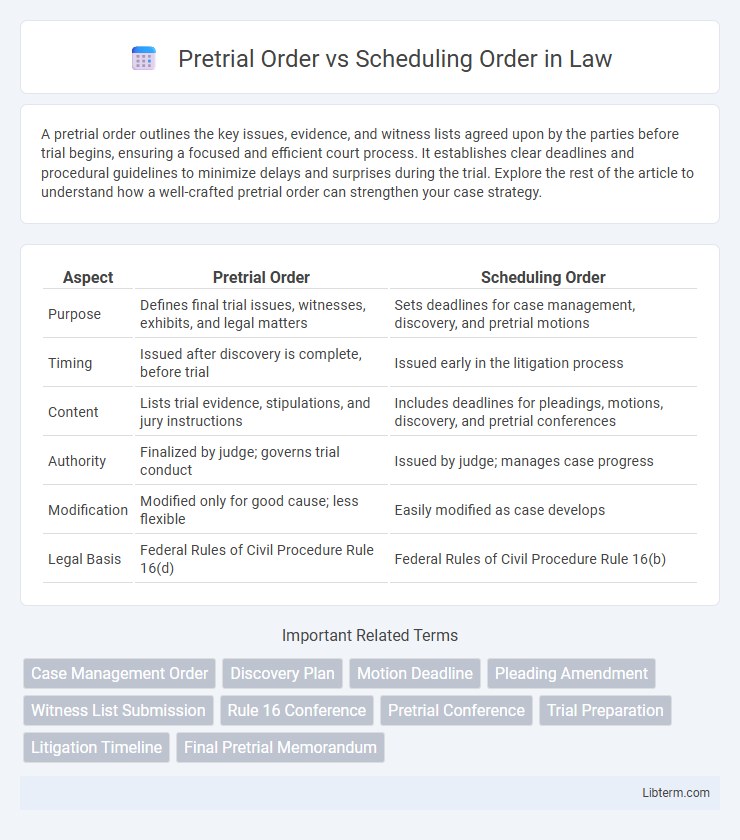A pretrial order outlines the key issues, evidence, and witness lists agreed upon by the parties before trial begins, ensuring a focused and efficient court process. It establishes clear deadlines and procedural guidelines to minimize delays and surprises during the trial. Explore the rest of the article to understand how a well-crafted pretrial order can strengthen your case strategy.
Table of Comparison
| Aspect | Pretrial Order | Scheduling Order |
|---|---|---|
| Purpose | Defines final trial issues, witnesses, exhibits, and legal matters | Sets deadlines for case management, discovery, and pretrial motions |
| Timing | Issued after discovery is complete, before trial | Issued early in the litigation process |
| Content | Lists trial evidence, stipulations, and jury instructions | Includes deadlines for pleadings, motions, discovery, and pretrial conferences |
| Authority | Finalized by judge; governs trial conduct | Issued by judge; manages case progress |
| Modification | Modified only for good cause; less flexible | Easily modified as case develops |
| Legal Basis | Federal Rules of Civil Procedure Rule 16(d) | Federal Rules of Civil Procedure Rule 16(b) |
Introduction to Pretrial and Scheduling Orders
Pretrial orders establish the framework for the trial by outlining the issues to be decided, witness lists, evidence, and legal arguments, ensuring the case proceeds efficiently. Scheduling orders set critical deadlines for discovery, motions, and other pretrial procedures, promoting timely case management. Both documents streamline litigation by organizing case preparation and court activities.
Definition of Pretrial Order
A Pretrial Order is a court-issued document that outlines the agreed-upon facts, legal issues, witnesses, exhibits, and procedural rules guiding the trial process. It serves to streamline the trial by resolving preliminary matters and clarifying the scope of the dispute before the trial begins. Unlike a Scheduling Order, which sets deadlines for case management activities, the Pretrial Order finalizes agreements and trial preparations.
Definition of Scheduling Order
A Scheduling Order is a court-issued directive that outlines key deadlines and procedures for the progression of a lawsuit, including discovery deadlines, motion filing dates, and trial timelines. It serves as a framework to ensure efficient case management and adherence to procedural rules. Unlike a Pretrial Order, which focuses on final arrangements before trial, the Scheduling Order governs the overall timetable from the early stages of litigation.
Key Differences Between Pretrial and Scheduling Orders
A Pretrial Order outlines the guidelines for the trial, including witness lists, exhibits, and legal issues to be addressed, while a Scheduling Order sets deadlines for pretrial activities such as discovery and motion filings. The Scheduling Order is typically issued early in the litigation process to organize case management timelines, whereas the Pretrial Order is finalized closer to trial to consolidate procedural details. Key differences also include the Scheduling Order's focus on time management and case flow, contrasted with the Pretrial Order's role in clarifying trial logistics and narrowing issues for trial.
Purpose and Importance of Pretrial Orders
Pretrial Orders establish specific guidelines and deadlines tailored to the case, ensuring all parties are prepared for trial by outlining the issues, evidence, and witness lists. They play a critical role in streamlining courtroom processes, minimizing disputes, and facilitating efficient case management. Unlike Scheduling Orders, which set broader timelines for case progression, Pretrial Orders directly influence trial readiness and procedural clarity.
Purpose and Importance of Scheduling Orders
Scheduling orders establish a comprehensive timeline for pretrial activities, ensuring organized case management and adherence to statutory deadlines. They serve to coordinate discovery, motions, and trial dates, preventing delays and promoting judicial efficiency. Scheduling orders are crucial for maintaining procedural discipline and facilitating fair and timely resolution of disputes.
Components of a Pretrial Order
A Pretrial Order typically includes detailed components such as the identification of parties, a concise statement of the case, stipulations of facts, issues for trial, witness lists, exhibit lists, and anticipated evidentiary and procedural motions. It also outlines deadlines for exchanging exhibits and discovery materials, as well as any agreements concerning jury instructions or verdict forms. This structured framework ensures both parties and the court are prepared for trial, streamlining the litigation process compared to the broader Scheduling Order.
Elements Included in a Scheduling Order
A Scheduling Order outlines key deadlines such as discovery cut-off dates, motions filing timelines, and trial dates, ensuring efficient case management. It typically includes specifics on the length and timing of discovery, deadlines for joining parties or amending pleadings, and dates for pretrial conferences. This contrasts with a Pretrial Order, which consolidates trial preparation details and evidence lists closer to the trial date.
Legal Implications of Violating Orders
Violating a Pretrial Order can lead to sanctions such as exclusion of evidence, fines, or even dismissal of claims due to non-compliance with court directives. Breaching a Scheduling Order often results in similar penalties, including extension denials for discovery deadlines or trial dates, impacting case strategy and court timelines. Courts emphasize strict adherence to both orders to maintain procedural integrity and ensure fair trial administration.
Choosing the Right Order for Your Case
Selecting the appropriate order depends on the specific phase and needs of your case; a Pretrial Order organizes trial-specific details like witness lists and exhibits, ensuring readiness for court, while a Scheduling Order sets deadlines for discovery and motions, structuring the overall timeline. Attorneys should evaluate case complexity, upcoming procedural steps, and court requirements to determine which order provides the best framework for efficient case management. Properly choosing between these orders enhances procedural clarity and helps avoid delays or sanctions during litigation.
Pretrial Order Infographic

 libterm.com
libterm.com